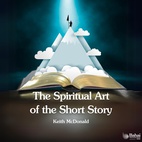The views expressed in our content reflect individual perspectives and do not represent the authoritative views of the Baha'i Faith.
In the debate between science and religion, religion has some important points to make—especially when it comes to evolution.
To continue exploring the territory covered in the Intelligence Squared debate of the motion that science refutes God, I’d be remiss if I didn’t examine the arguments put forward by Team B (for Believer).
Christian physicist Ian Hutchinson, author of Monopolizing Knowledge, began his presentation of the believer’s point of view somewhat differently than his atheist colleagues. Rather than impugning either their rational faculties or their personal beliefs, he directly took on the motion that science refutes God:
Let’s agree that this motion is not about whether, for example, the latest sociological theories disprove the gods and goddesses of ancient Greek mythology. No, it’s about whether modern natural science exemplified by things like physics, chemistry, biology, geology, and so on, rule out thoughtful theism.
… Our job is just to show that Christianity’s God is not refuted by science. Now, obviously there are some religious beliefs that are ruled out by science, for example, the belief that the earth is stationary and orbited by the sun, moon, and stars. That is disproved by science, and perhaps prior to the 17th century, most Christians held a belief like that, as did most other people. But that stationary earth belief is not in the least central to the Christian message and doctrine. (emphasis added)
Hutchinson rightly makes the point that the centrality of the Earth was a belief held by the generality of people once, regardless of their religion. But he is perhaps too kind in addressing its relationship to Christianity. The centrality of the Earth is not only “not in the least central to the Christian message,” it’s not part of Christ’s message at all. Neither Christ nor Moses, nor any other prophet prior to Baha’u’llah, said one word about how the planets aligned, though Muhammad did refer to the Sun as a fixed star.
Hutchinson then narrowed the target of the motion down to “Christianity’s God” and set up a challenge:
To establish the motion, what our opponents have to do is to show that some central tenet of what Christians believe about God is impossible or at least highly implausible in the light of science, and that’s a tall order. Actually, they can’t even come close.
I agree with that, but Hutchinson failed to address an argument the atheist team advanced about the irrationality of a God who punished all of humanity for the sins of a long dead ancestor, then required a further death (His own or His son’s, depending on which sectarian doctrine invoked) to redeem humanity, a humanity that continues to commit its own sins. This was unfortunate for Team B because they made some very cogent arguments in other areas. For example, Ian Hutchinson said:
I’ll illustrate one common argument from the writing of an MIT colleague, Alan Lightman, who wrote in the Salon magazine last year, he said, ‘The central doctrine of science is the view that the laws of nature are inviolable.’ He said, ‘Science and God are compatible as long as the latter, God, is content to stand on the sidelines once the universe has begun.’
Now, I certainly shall not shrink the God that I advocate down into a deistic, non-interventionist first cause. No, the God I’m interested in is personal and active in the world. So the question is, ‘How do I answer Alan Lightman?’ It’s straightforward. The presumption that the laws of nature are inviolable is just not a doctrine of science. Alan and a lot of other people are just wrong about that. Science’s method and its program is to describe the universe insofar as it is repeatable and follows universal laws, but science hasn’t got the slightest need to extrapolate that method and program into a presumption that everything that happens must be so describable. And the majority of the scientific heroes of history did not make that presumption. (emphasis added)
I found Hutchinson’s phraseology interesting and apt: “The presumption that the laws of nature are inviolable is just not a doctrine of science.”
I leave it to the reader to decide if science ought to have doctrines or if, as Professor Hutchinson says, science is a method of describing the universe that “…hasn’t got the slightest need to extrapolate that method and program into a presumption that everything that happens must be so describable.” I must also leave it to the reader to decide which of these eminent scientists is doctrinally correct and what ‘correctness’ means in this context. However, when one of the most significant charges against religion is that it is absolutist, and one of the chief virtues alleged of science is that it evolves, I have to question the logic of any Doctrine of Inviolability, whether religious or scientific.
As far as we can discern, everything in nature evolves, up to and including the universe itself, to say nothing of our understanding of it. The idea that the laws of nature are inviolable seems to fly in the face of that. Moreover, it leads to the hubristic idea that once we have understood a law of nature, we need question it no further.
For Baha’is, nature and the universe aren’t the only things that evolve—so does religion. That made me think of this passage from the writings of Abdu’l-Baha: “Religion must be living, vitalized, moving and progressive. If it be non-progressive it is dead.” He concludes his comments with a question—a pertinent one in view of the subject of this series:
Shall man gifted with the power of reason unthinkingly adhere to dogma which will not bear the analysis of reason? – Foundations of World Unity, p. 84.
You May Also Like
Comments

















So is it fair to say that the believers owe their progression in understanding of their religions to science? And if science was able to trim religious beliefs in the past, why should we believe it stopped to do so now?
"And we all, who with unveiled faces contemplate the Lord's glory, are being transformed into his image with ever-increasing glory, which comes from the Lord, who is the Spirit." ( 2 Corinthians 3:18)
This is one of my favorite verses because it contains a metaphor that I found key to grasping the relationship between God and His chosen Messenger. This is the idea that, as Baha'u'llah has also said, the Manifestation of God is God as ...seen in a human mirror, which displays the attributes or "names" of God in a form we can grasp. I wonder why such an important metaphor was excluded in the translation you used. What version was it?
"Now to the One who is able to strengthen you according to my gospel and the proclamation of Jesus Christ, according to the revelation of the mystery that was kept secret for long ages but is now disclosed..." (Romans 16:24,25).
Paul made a distinction between the revelation which God formerly gave and ...that which He was presently giving. The Divine Revelation were not all given at once, but in evolving stages of our human consciousness.